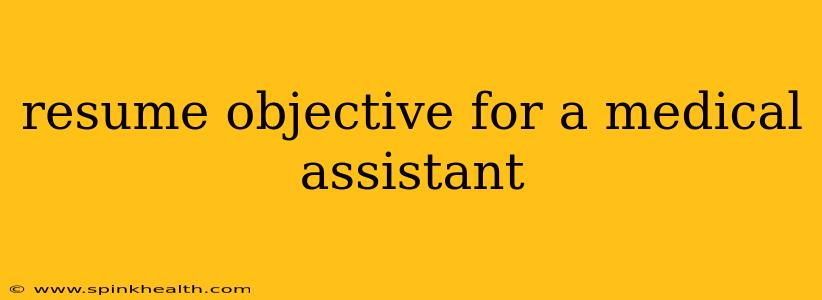Crafting the Perfect Resume Objective for a Medical Assistant: A Story of Skill and Ambition
Landing that dream medical assistant job starts with a compelling resume—and a strong objective statement is the key that unlocks the door. Think of your resume objective as your elevator pitch, a concise summary of your skills and aspirations that immediately grabs the hiring manager's attention. It's not just about listing your qualifications; it's about telling a story of how your unique blend of experience and ambition makes you the ideal candidate.
This isn't just another generic template; this is a guide to crafting a personalized objective that resonates with your specific goals and the requirements of the position. We'll explore different approaches, address common pitfalls, and equip you with the tools to create an objective that truly shines.
Why bother with a resume objective?
In today's competitive job market, a well-written objective can significantly increase your chances of getting noticed. It provides a targeted introduction that highlights your key strengths and aligns them with the specific needs of the employer. This focused approach surpasses a generic summary, demonstrating your understanding of the role and your eagerness to contribute.
What to include in your Medical Assistant Resume Objective:
Your objective should be brief, impactful, and tailored to each job application. It should incorporate these key elements:
-
Your primary goal: What are you hoping to achieve in this role? Are you seeking a challenging position, an opportunity for professional growth, or a chance to contribute to a specific medical team?
-
Relevant skills: Showcase 2-3 of your most valuable skills directly related to the job description. Think clinical skills (vital signs, phlebotomy, EKG), administrative skills (scheduling, medical records management), or interpersonal skills (communication, patient care).
-
Company/position alignment: Demonstrate that you've researched the employer and understand their values and mission. Show them you’re not just applying randomly; you're genuinely interested in their organization.
Examples of Effective Medical Assistant Resume Objectives:
Let's look at some examples to illustrate different approaches:
Example 1 (Focus on experience):
Highly skilled and experienced Medical Assistant seeking a challenging position at [Hospital Name]. Proven ability in phlebotomy, EKG administration, and patient interaction. Eager to contribute to a dynamic healthcare team and leverage my five years of experience in a fast-paced medical environment.
Example 2 (Focus on growth):
Enthusiastic and detail-oriented Medical Assistant with a strong foundation in clinical and administrative tasks seeking a growth-oriented position at [Clinic Name]. Eager to expand my skills in [specific skill] and contribute to a patient-centered environment.
Example 3 (Focus on specific skills):
Certified Medical Assistant with expertise in electronic health record (EHR) management and patient education. Seeking a position at [Practice Name] where I can utilize my strong communication skills and clinical proficiency to provide exceptional patient care.
Common Mistakes to Avoid:
-
Generic statements: Avoid clichés like "seeking a challenging position" without specifying what makes the position challenging or how your skills fit the challenge.
-
Too much information: Keep it concise. The objective is an introduction, not a full job history.
-
Irrelevant information: Focus on skills directly relevant to the medical assistant role. Avoid mentioning unrelated hobbies or interests.
-
Typos and grammatical errors: Proofread carefully! Errors undermine your credibility.
Should you use an objective statement at all?
While once considered a staple, the resume objective is now less universally recommended. Some career experts suggest using a summary statement instead, which highlights accomplishments rather than aspirations. However, a well-crafted objective can be highly effective, particularly when targeting a specific role or company where highlighting your goals and aligning them with the employer's needs is advantageous.
Ultimately, the best approach depends on your experience level and the specific job you are applying for. Consider your unique circumstances and choose the strategy that best showcases your qualifications and enthusiasm. Remember, your resume objective is your first impression – make it count!

